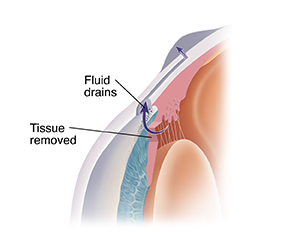Understanding Trabeculectomy
Trabeculectomy is a type of eye surgery done in the front part of the eye. It’s done to treat glaucoma by draining some fluid from the eye. This helps to lower pressure inside the eye.
What is glaucoma?
The area in front of the colored part of your eye (iris) is full of fluid. Normally this fluid slowly drains out of your eye through a network of tiny channels. It drains out into the veins of your body. This helps keep the amount of fluid in the eye steady.
Glaucoma is a group of eye diseases that can cause vision loss and blindness by damaging the nerve in the back of your eye called the optic nerve. If you have glaucoma, fluid can drain too slowly. Or your eye may make too much fluid. This can cause the pressure in your eye to build up. This then increases pressure on the optic nerve. The optic nerve sends visual information to your brain. If the pressure increases too much, it can damage your optic nerve. This can cause vision loss. During a trabeculectomy, a surgeon makes a new opening for fluid to leave the eye.
Why trabeculectomy is done
You might need this procedure if you have glaucoma that isn’t controlled with eye drops or laser treatment. Without treatment, over time glaucoma can cause a loss of side (peripheral) vision. Central vision may decrease, too. Together, these problems can cause total blindness.
Your eye care provider may advise a trabeculectomy to help keep your glaucoma from getting worse. But it doesn't restore vision that is already lost.
How trabeculectomy is done
During a trabeculectomy, the eye is numbed. The surgeon makes a small opening in the top of your eye under your eyelid. This opening lets extra fluid drain away, lowering the pressure in your eye.

Risks of trabeculectomy
All surgery has some risks. The risks of trabeculectomy include:
-
Tearing of the conjunctiva
-
Tearing of the sclera (this is rare)
-
Too much bleeding
-
High pressure inside the eye
-
Low pressure inside the eye
-
Bleeding into the eye
-
Eye infection
-
Cataract
-
Surgery that doesn't work
-
Need for a repeat surgery
Your risks may vary according to your age, your overall health, and other factors. Talk with your eye care provider about all your concerns and about the risks that apply to you.
Online Medical Reviewer:
Heather M Trevino BSN RNC
Online Medical Reviewer:
Vinita Wadhawan Researcher
Online Medical Reviewer:
Whitney Seltman MD
Date Last Reviewed:
9/1/2024
© 2000-2025 The StayWell Company, LLC. All rights reserved. This information is not intended as a substitute for professional medical care. Always follow your healthcare professional's instructions.